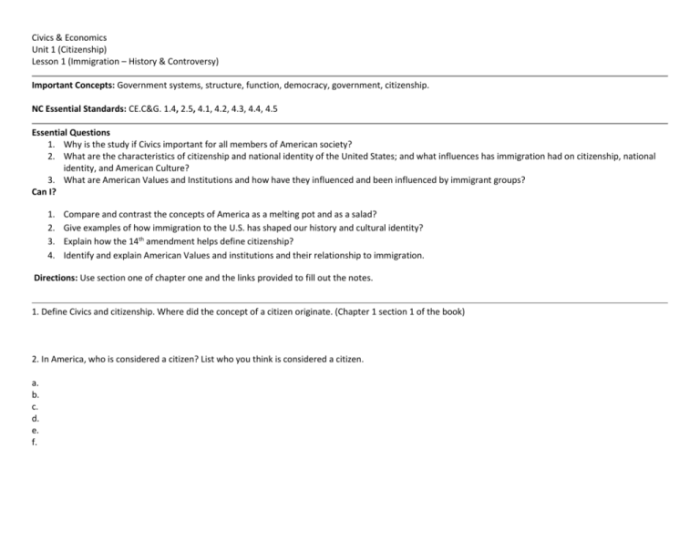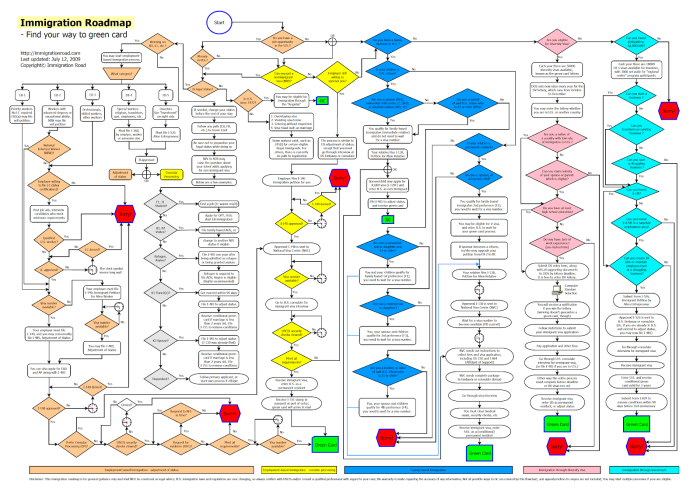The immigration pathway to citizenship answer key PDF provides a comprehensive guide to the various pathways available for individuals seeking to obtain citizenship in a foreign country. This document Artikels the eligibility criteria, application process, and legal framework governing immigration pathways, offering valuable insights for aspiring citizens.
This detailed guide delves into the history, key features, and economic and social implications of immigration pathways, providing a well-rounded understanding of this complex topic. By comparing different pathways and addressing ethical considerations, the answer key PDF serves as an authoritative resource for anyone navigating the intricacies of immigration law.
Immigration Pathway to Citizenship: Overview

An immigration pathway to citizenship is a legal framework that allows foreign nationals to obtain citizenship in a particular country through a series of steps and requirements. These pathways vary in eligibility criteria, application processes, and timelines, providing individuals with different routes to becoming citizens.
Immigration pathways to citizenship have a long history in many countries, dating back to the early days of nation-building. They have evolved over time to reflect changing demographics, economic needs, and social attitudes towards immigration.
Key Features of an Immigration Pathway to Citizenship
Eligibility Criteria and Requirements, Immigration pathway to citizenship answer key pdf
Immigration pathways to citizenship typically have specific eligibility criteria that applicants must meet. These criteria may include factors such as age, education, language proficiency, and financial stability. Additionally, applicants may be required to pass background checks, medical examinations, and other assessments.
Application Process
The application process for an immigration pathway to citizenship can be complex and time-consuming. Applicants must gather extensive documentation, submit forms, and attend interviews. The processing time can vary significantly depending on the country and the specific pathway being pursued.
Legal Framework and Regulations
Governing Laws and Regulations
Immigration pathways to citizenship are governed by a complex legal framework that includes laws, regulations, and international treaties. These legal frameworks establish the eligibility criteria, application processes, and rights and responsibilities of applicants.
Legal Precedents
Legal precedents play a significant role in shaping the interpretation and application of immigration laws. Court decisions can clarify eligibility criteria, establish new standards for review, and provide guidance on the exercise of discretion by immigration officials.
Economic and Social Implications
Economic Benefits
Immigration pathways to citizenship can have significant economic benefits for host countries. Immigrants often bring valuable skills, knowledge, and entrepreneurial spirit, contributing to economic growth and innovation.
Social Impact
Immigration pathways to citizenship can also have a profound social impact. They can foster integration, promote diversity, and strengthen communities. However, they can also raise concerns about cultural assimilation, social cohesion, and the potential for discrimination.
Comparative Analysis of Different Pathways: Immigration Pathway To Citizenship Answer Key Pdf

There are a variety of immigration pathways to citizenship available in different countries. These pathways can be categorized into several broad types, including family-based immigration, employment-based immigration, and humanitarian-based immigration.
Each type of pathway has its own eligibility criteria, application process, and timelines. It is important to compare and contrast these pathways to determine which one is the most appropriate for individual circumstances.
Ethical Considerations

Responsibilities of Governments and Individuals
Governments have a responsibility to design and implement immigration pathways to citizenship that are fair, equitable, and transparent. They must also ensure that the application process is free from discrimination and bias.
Individuals have a responsibility to comply with the laws and regulations governing immigration pathways to citizenship. They must provide accurate information and documentation, and they must be prepared to undergo the necessary background checks and assessments.
FAQ Corner
What are the different types of immigration pathways to citizenship?
There are various types of immigration pathways to citizenship, including family-based immigration, employment-based immigration, investment-based immigration, and humanitarian-based immigration.
What is the role of eligibility criteria in immigration pathways?
Eligibility criteria play a crucial role in determining an individual’s qualification for a particular immigration pathway. These criteria may include factors such as age, education, work experience, language proficiency, and criminal history.
How can I obtain an immigration pathway to citizenship answer key PDF?
The immigration pathway to citizenship answer key PDF is typically available on the websites of government agencies responsible for immigration matters or through legal professionals specializing in immigration law.